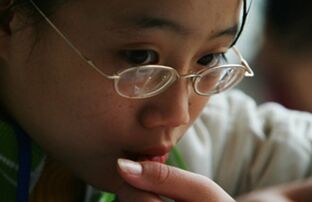研究显示 长时间待在教室会导致近视
|
The more years you spend in full-time education, the more short-sighted you are likely to be, according to a large UK study. The link appears to be that students have too little exposure to bright natural light -- and the antidote suggested by the researchers is for children to spend more of the day outdoors. The study, carried out by Cardiff and Bristol university scientists, analysed information on the genetics, eyesight and educational background of 68,000 participants in the UK Biobank database.
The findings, published in the BMJ, imply that a graduate who spent 17 years in education is on average one dioptre more short-sighted that someone who left school at the age of 16 after spending 12 years in education. That deterioration is equivalent to the difference between having perfect vision and needing glasses to drive safely. "With the rapid rise in the global prevalence of myopia and its vision-threatening complications, together with the economic burden of visual loss, the findings of this study have important implications for educational practices," said Jez Guggenheim, of Cardiff University's School of Optometry and Vision Sciences. Using Biobank data, the Bristol and Cardiff scientists analysed 44 genetic variants associated with risk of myopia and 69 variants associated with time spent in education. They found that while the number of years at school and college strongly influenced eyesight, there was no effect in the opposite direction: propensity to myopia did not lead people to remain in education for longer. |









